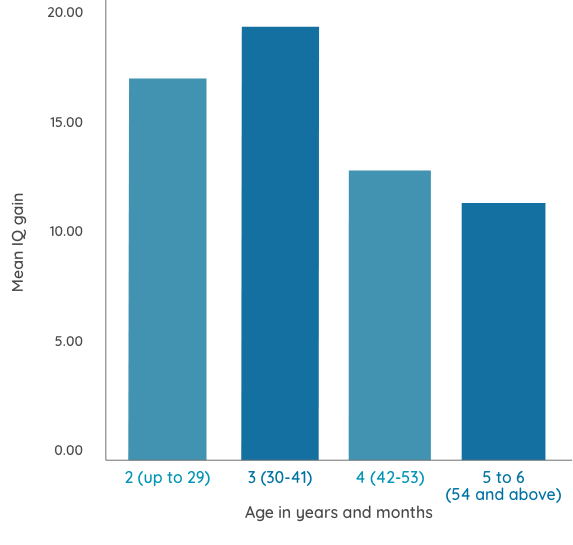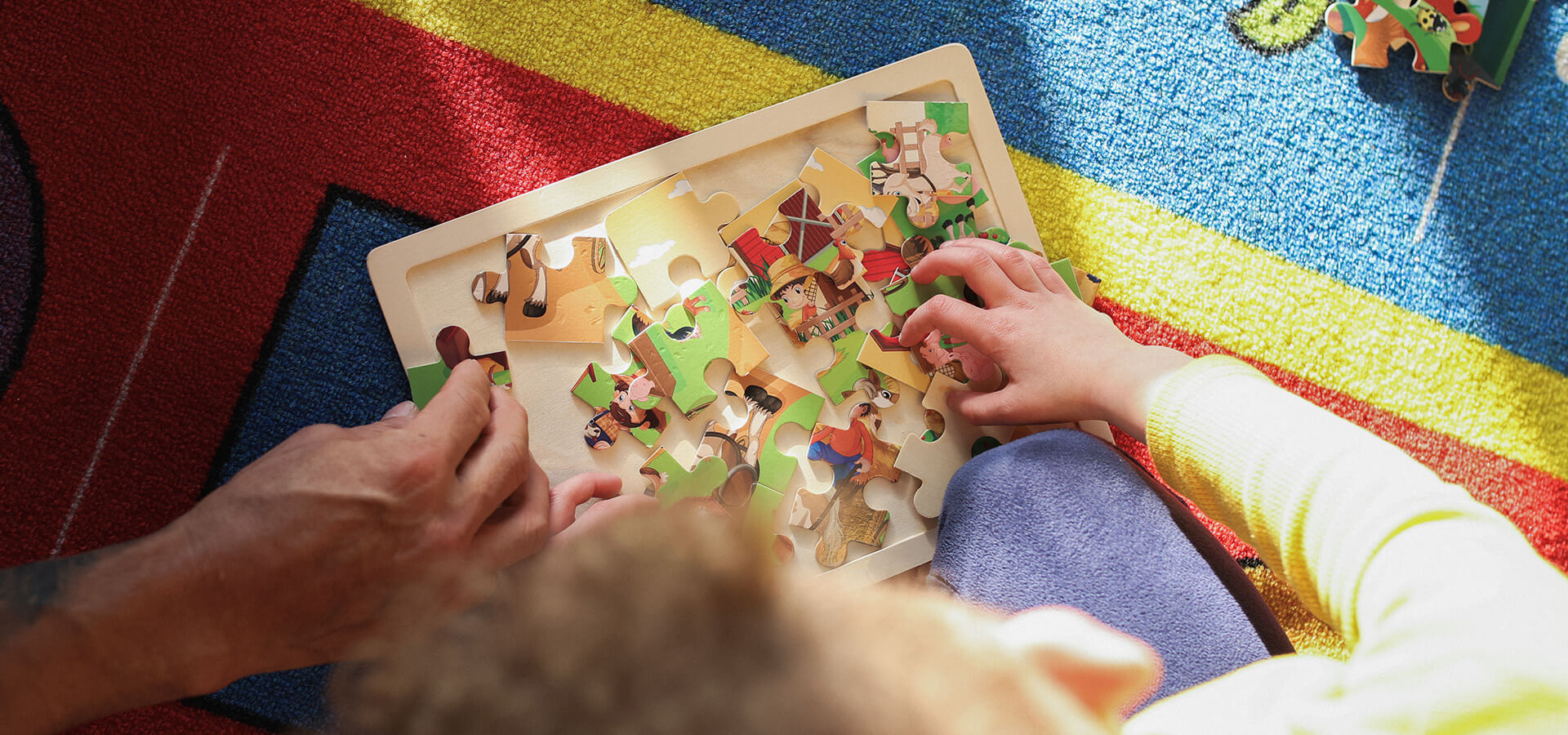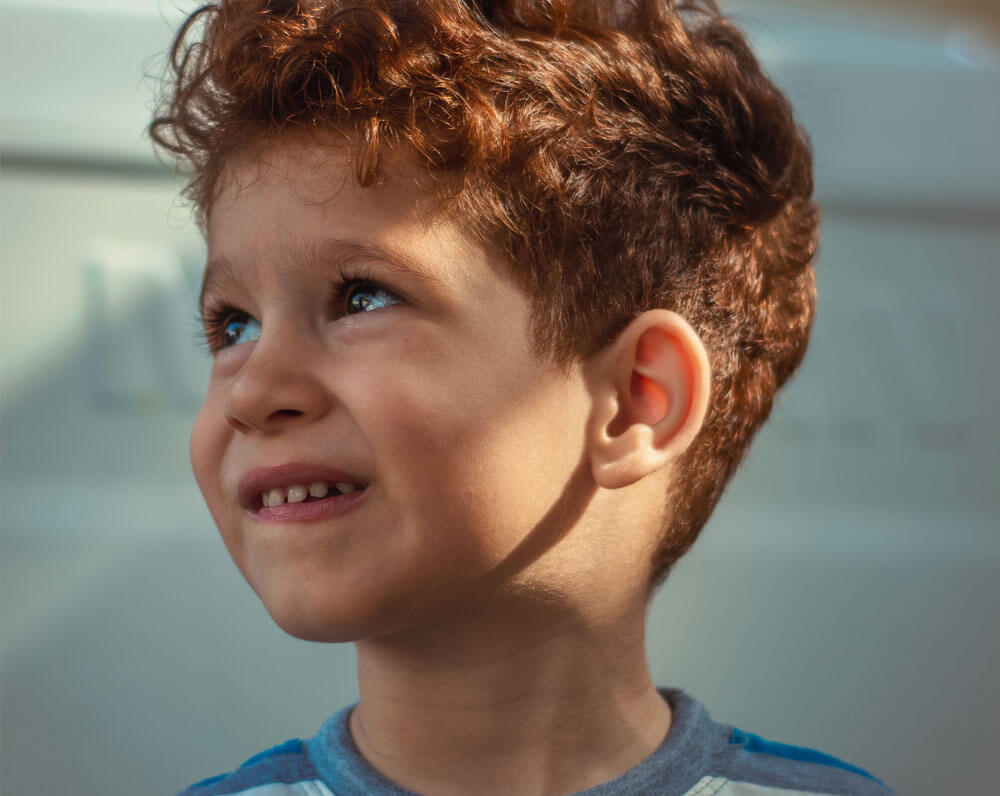
Diagnostic Evaluation for Autism
A diagnostic evaluation is the first step toward understanding your child’s needs and beginning ABA therapy. If you’re not sure your child is ready, try our quick child development screener to spot early signs, and if concerns appear, a diagnostic evaluation is the next step.

Why Early Intervention Matters
Early intervention can change the course of a child’s development. When autism is identified at a young age, children have more time to build essential communication, social, and daily living skills during the most important years of brain growth. A diagnostic evaluation is the first step to accessing therapy, support, and resources that can make a lifelong difference.
What the research shows:
Children who begin therapy before age 3 see the greatest improvements in learning and development. The chart shows the average IQ gains by age when therapy begins. While progress is possible at any age, the earlier children start, the more dramatic the results.
Request Diagnostic EvaluationDiagnostic Evaluation vs. Screening: What’s the Difference?
If you’re concerned about your child’s development, it’s important to know the difference between a screening and a diagnostic evaluation. A screening is a quick first step if you’re unsure about early signs, but only a diagnostic evaluation can confirm autism and open the door to therapies, insurance coverage, and school support.
How Insurance May Affect the Telehealth Evaluation Process
In some cases, insurance requires extra steps before a diagnostic evaluation can begin. When this happens, a master’s-level clinician may first conduct the diagnostic interview via telehealth to gather the information needed for authorization. Once approval is received, in-person testing is completed at a Caravel clinic, and a Caravel doctor reviews the results and provides final feedback during a telehealth appointment.
We’ll guide you through every step and coordinate with your insurance company on your behalf, so you can focus on your child.
We accept most insurance providers
Explore Insurance & Financials+100 more
The Process of Evaluation
Watch the video to learn more about the process of diagnostic evaluation and the benefits of early intervention for the best outcomes.
Our Diagnostic Team
Learn more about our team of diagnosticians. These clinicians provide testing, counseling, and clinical coordination with teammates across Caravel and have an average of more than a decade of experience evaluating the behavioral and developmental needs of children.
Our Counseling & Diagnostics leadership team ensures every evaluation is thorough, accurate, and compassionate. They guide our clinicians, uphold clinical standards, and bring deep expertise in autism diagnosis to help families get clear answers and a path forward.
Dr. Mike is a child and adolescent psychologist with decades of experience working with individuals and their families. Prior to graduating from the Chicago School of Professional Psychology in 2007 with his doctorate in clinical psychology, Dr. Mike earned two master’s degrees in psychology. Throughout his education and training, he has focused his attention on the assessment and treatment of children and adolescents. Following the confirmation of his doctoral degree, Dr. Mike specialized his clinical focus on Autism Spectrum Disability (ASD) and has completed a post-graduate certificate in Applied Behavior Analysis (ABA). He has personally worked with individuals diagnosed with ASD in individual psychotherapy and in group settings.
An integral member of Caravel Autism Health since 2016, Dr. Mike played a key role in advancing Psychological Services to where it is today. He is responsible for developing the comprehensive assessment battery utilized throughout Caravel and for integrating psychotherapeutic services, such as individual psychotherapy and family support, into the offerings of the organization.
Cheri has been working in the field of Applied Behavior Analysis (ABA) since 2008. She has been administering diagnostic testing and evaluations to children as one of Caravel’s leading diagnostic clinical therapist since 2016. Prior to that, she both provided in-home ABA therapy and diagnostic testing and served as a clinical supervisor for another ABA provider. Cheri is passionate about working with children and their families throughout the evaluation process and providing continued family support.
She earned her bachelor’s degree in psychology and a certificate in forensic science in 2005 and her master of science in educational psychology, with an emphasis in community counseling, in 2008—all from University of Wisconsin-Milwaukee. Cheri earned a post-graduate certificate in ABA from Florida Institute of Technology in 2020.
Dr. Chuck focuses on the evaluation and diagnosis of Autism Spectrum Disability, as well as providing psychotherapy services for individuals and families. He completed his master’s and doctoral degrees in clinical psychology at the Chicago School of Professional Psychology, directing his clinical training toward working with individuals with Autism Spectrum Disability, specifically focusing on psychological and neuropsychological assessment. Dr. Chuck has provided such evaluations in private practice, accredited outpatient hospitals, foster care, and forensic settings. His doctoral dissertation, “Parental Perceptions of Screen-Based Media Use in Children Referred for Autism Spectrum Disability Assessment” was awarded Best Original Research in Progress by the Illinois Psychological Association and was subsequently “defended with distinction.”
Dr. Chuck is a firm believer in meeting individuals at their level and helping develop interests into strengths. A self-described “geek therapist,” he has participated in panels discussing the therapeutic uses of video and tabletop games at world-renowned conventions such as GenCon and DragonCon and approaches psychotherapeutic treatment using his clients’ interests and passions as a way to grow and develop adaptive life skills.
Dr. Meg is a licensed psychologist and BCBA with almost 20 years of experience working with children, adolescents, and adults with developmental differences and mental health concerns. She has expertise in Autism Spectrum Disability (ASD), ADHD, trauma, and mood/anxiety disorders. Dr. Meg began her journey with ASD in 2008, working as a behavioral therapist providing ABA therapy for children in home and school settings. After earning her BCBA certification in 2013, she served as a behavior intervention specialist for a large school district, and then went on to provide intensive intervention services for children with developmental differences at therapeutic summer camps, work with children and families with severe mental health diagnoses at a community health center, and provide services in both a charter school and senior living community.
Dr. Meg completed her doctoral program in clinical psychology from Pacifica Graduate Institute in 2020. She joined Caravel in 2023 as a licensed psychologist and is now enjoying her role as clinical supervisor, training post-doctoral trainees and completing autism assessments for children and adolescents.
Our Diagnostic Clinical Therapists conduct comprehensive assessments to identify developmental, behavioral, or emotional needs and guide each family toward the appropriate services. They collaborate closely with clinicians and families to translate diagnostic insights into clear, actionable care recommendations.
A cofounder of Caravel, Chris has been working in the field of Applied Behavior Analysis (ABA) in the United States, Canada, and Europe since 1994. He has held various roles throughout his career—from serving as a behavior therapist and a clinic director to overseeing operations and diagnostics—and was among the first to bring ABA to Fox Valley, Wisconsin. Chris is passionate about providing high-quality autism treatment to those in need. He equally loves working with children and their families, helping them learn new skills, and aiding employees to develop and grow within their positions.
Chris earned his bachelor’s degree in psychology and sociology from St. Norbert College, his master of science in counseling from Capella University, and his BCBA certification from Florida Institute of Technology.
Rebecca has been working in the field of Applied Behavior Analysis (ABA) with individuals and their families since 2012. Throughout her career, she has worked at several clinics providing behavior analytic services directly and indirectly and has done so through a variety of roles, including behavior technician, lead therapist, center director, and now diagnostic clinical therapist. Rebecca truly enjoys the diagnostic process and partnering with families and the full diagnostic team to set children on an individualized path to foster their success.
Rebecca has a master’s degree in clinical social work and is certified as a BCBA.
Sarah has been working in the field of Applied Behavior Analysis (ABA) since 2008. She has always had a passion for early intervention and began her career as a senior therapist working directly with children to build daily living skills, communication skills, and social. Sarah loves seeing the positive impact ABA can have on children’s and families’ lives and training fellow staff to conduct the high-quality interventions and assessment procedures that make this growth possible.
Sarah graduated with a bachelor’s degree in psychology from the University of Wisconsin-Green Bay in 2009 and completed her master’s degree in counseling from Lakeland College in 2011. In 2016, Sarah obtained her Board Certified Assistant Behavior Analyst certification to further her development in the field of ABA and early intervention.
Our Post-Doctoral Fellows are advanced trainees who support clinical and research initiatives while receiving specialized mentorship and supervision. They contribute to assessment, data analysis, and program development, helping expand Caravel’s clinical expertise and evidence-based practices.
Dr. Danielle began working with individuals on the autism spectrum and providing diagnostic evaluations and therapy to individuals and their families upon graduating from the Chicago School of Psychology’s clinical psychology program. In addition to Autism Spectrum Disability, she also has worked with individuals impacted by depression, anxiety, trauma, and mood struggles related to health impairments.
Dr. Danielle enjoys utilizing pop culture during therapeutic intervention to establish rapport and to engage individuals in therapy. She tailors treatment plans to the individual needs of each client and prefers to use a collaborative approach to treatment, actively involving the client and/or their parents in the treatment planning process. Dr. Danielle delights in celebrating the unique victories and successes of her clients and seeks to be an advocate for every child and family with whom she works.
Dr. Denise comes to Caravel with more than 20 years of experience supporting neurodivergent individuals through comprehensive evaluations, positive behavior intervention planning, and collaboration with educators to help children thrive in academic settings. She spent 16 years as a school psychologist, conducting evaluations for special education eligibility under federal and state guidelines, and served as a school behavior management specialist for three years, focusing on students with Autism Spectrum Disability.
Denise has a bachelor’s degree in psychology from Emory University; holds a master of science of education in preschool psychology and a PhD in school psychology from Fordham University; and completed her BCBA program at Florida Institute of Technology. Her approach centers on empowering caregivers, promoting autonomy, and fostering clear, supportive communication to guide families through the intervention process.
Dr. Kirk has been working in the field of Applied Behavior Analysis (ABA) since 2011 and earned his BCBA certification in 2013. His wide-ranging ABA experience spans behavior assessments, developing individualized treatment plans, parent coaching, consultation, and teaching graduate-level ABA courses.
Following his graduation from Grand Valley State University with a bachelor’s degree in psychology in 2002 and a master’s degree in school counseling in 2007, Dr. Kirk earned his doctorate in clinical psychology from California Southern University in 2020. He is passionate about providing timely access to diagnostic services for autism spectrum disability, promoting early intervention, and helping each child achieve meaningful outcomes that focus on unique interests and family values.
Dr. Michelle brings extensive and diverse experience to the field of mental health, with a particular passion for working with children and adolescents. She finds deep fulfillment in helping families grow stronger, witnessing firsthand the powerful transformations that occur through compassionate, collaborative care.
Michelle began as an ABA therapist, laying the foundation for a wide-ranging professional journey. She went on to hold numerous impactful roles, including a substance use counselor at a nonprofit, a clinical psychologist at a maximum security correctional facility, a therapist at a public service organization supporting the homeless, and a diagnostician providing residential dual diagnosis services. She graduated with a bachelor of science in criminal justice from the University of Phoenix in 2012; she then attended Walden University, earning her master of science in psychology in 2014 and completing her PhD in clinical psychology in 2022.
Active in mental health and psychology fields since 2014, Dr. Sandy has extensive experience providing therapeutic services to children, adolescents, and adults across a variety of clinical settings as well as supporting individuals with anxiety, depression, and trauma-related conditions. She is deeply passionate about fostering resilience and empowerment in individuals who face systemic barriers, especially neurodivergent children and those from marginalized communities. She also has a strong interest in culturally responsive care, social-emotional development, and identity formation.
Dr. Sandy earned her bachelor’s degree in communication disorder, her master’s degree in counseling, and her doctoral degree in counseling psychology from Andrews University.
Since 2007, Dr. Stephanie has developed an extensive history, working with adolescents, adults, couples, families, and individuals with various mental health issues. Her experience prior to Caravel including working in a private practice conducting bariatric, pain, and fertility psychological evaluations; providing drug and alcohol treatment in group and individual settings, individual therapy, and therapy for foster care agencies; and serving veterans, children, and families in non-profit organizations.
Dr. Stephanie graduated with a bachelor’s degree in psychology and family studies from the University of New Mexico in 2007, completed her doctorate in clinical psychology at Saybrook University in 2021, and is currently pursuing her masters of clinical psychopharmacology at the Chicago School of Professional Psychology. Working from a humanistic perspective, she strives to recognize the uniqueness of each individual and their life experiences and maximize their unique well-being.
Dr. Tyla’s predoctoral clinical experience includes providing therapy to children and adolescents ages 6–18, conducting autism evaluations, and completing comprehensive neuropsychological and psychological assessments. She places strong emphasis on diagnostic clarity and thoughtful, thorough report writing to ensure each child’s strengths and needs are clearly understood. She is dedicated to delivering family-centered care and collaborating with multidisciplinary teams to develop practical, meaningful recommendations that foster growth and long-term success.
Dr. Tyla earned her bachelor’s degree in psychology, her master’s degree in criminal justice and healthcare administration, and her doctorate in clinical psychology.
Dr. Victoria has been providing psychological assessment and therapy for individuals with developmental disabilities since 2009. She has served neurodiverse clients as a psychological associate for over a decade and a telehealth therapist for four years.
Dr. Victoria earned her bachelor’s degree in secondary education at the University of Pittsburgh in 2009 and completed her master’s degree and her doctorate in clinical psychology at Walden University in 2009 and 2019, respectively. She is passionate about using telehealth to conduct remote assessments for autism spectrum disability because it allows for early identification and intervention while making diagnostic services more accessible to those in underserved or remote areas.
Xan brings extensive experience to Caravel. Since 2004, she has worked in a wide range of capactities, including autism assessment, diagnosis, and intervention in both school and clinical settings; treatment of childhood and adult trauma; and therapy with children, adults, couples, and families. For the past eight years, she has served as the lead clinician on a school district’s Autism Identification Team.
A mother of five, Xan dedicated more than two decades to raising her family. When her youngest child began showing signs of autism, the experience sparked a personal and professional passion that shaped her clinical focus during her practicum with a neuropsychologist.
Xan earned her master of science in psychological counseling from Walden University in 2009 and her doctorate in clinical psychology from Walden University in 2018.
Autism Services FAQs
A diagnostic evaluation is a targeted assessment of a child’s social communication skills along with opportunities to observe and discuss restricted and repetitive patterns of behavior. This evaluation is important because it helps to identify (or rule out) the presence of Autism Spectrum Disorder (ASD), which opens the door to access services and supports that are not available without the diagnosis.
At Caravel Counseling & Diagnostics, we use a team-based approach to assessment. Depending on insurance requirements, a doctor may complete an initial interview with a parent or caregiver and then conduct a structured observation of the child. In other instances, a master’s-level clinician (referred to as a Diagnostic Clinical Therapist) may conduct the interview and administer psychological tests to the child, with the doctor interpreting the results and providing feedback.
There is no specific age to receive an autism diagnosis, and we encourage parents to receive an evaluation as early as possible when they start to be concerned about their child’s development. We can start seeing signs of social communication deficits as early as 12 months of age, with restricted and repetitive patterns of behavior emerging between 12 and 36 months of age. Caravel serves children between the ages of 12 months and 11 years.
A child development screener is a brief, accessible tool you can complete from home to identify possible developmental concerns and help you decide whether to seek a full assessment.
A diagnostic evaluation is a much more in-depth, clinician-led process. Caravel’s diagnosticians gather detailed history, observe your child, use standardized assessment tools, and provide a formal diagnosis (or rule one out).
The screener is a first step—not definitive. A diagnostic evaluation is what’s needed to confirm—and guide—clinical decisions and therapeutic planning.
Included in the evaluation process is an initial interview, which can take anywhere from 30 to 60 minutes. Following the interview, depending on the evaluation format, the assessment can take 30 minutes to three hours. Finally, there is a parent/caregiver feedback appointment, which can take, depending on the amount of information to discuss, 30 to 60 minutes.
If your child receives a telehealth evaluation, depending on his or her age and level of communication skills, you can expect to support the doctor’s observations by engaging in a number of structured activities with your child. Older children with more developed communication skills will interact directly with the doctor. If your child receives an in-person evaluation, (again) depending on his or her age and level of communication skills, you will be asked to sit in the room with the technician as the tests are administered to your child. If your child is older and has age-appropriate language skills, you may be asked to wait in the waiting room.
Often, yes — a diagnostic evaluation or testing for autism can be billed to insurance (or Medicaid, where allowed) at Caravel. That said, coverage depends on your specific insurance plan, state regulations, and whether the services meet the insurer’s criteria. Caravel works with each family to verify benefits, submit claims, and guide you on what your plan may or may not pay for.
Once all testing and assessments are complete, a CCD (Counseling & Diagnostic) clinician meets with you for feedback. You’ll get a clear diagnosis (or a ruling out), and a full explanation of what was observed, what strengths your child has, what challenges, and what support is needed.





